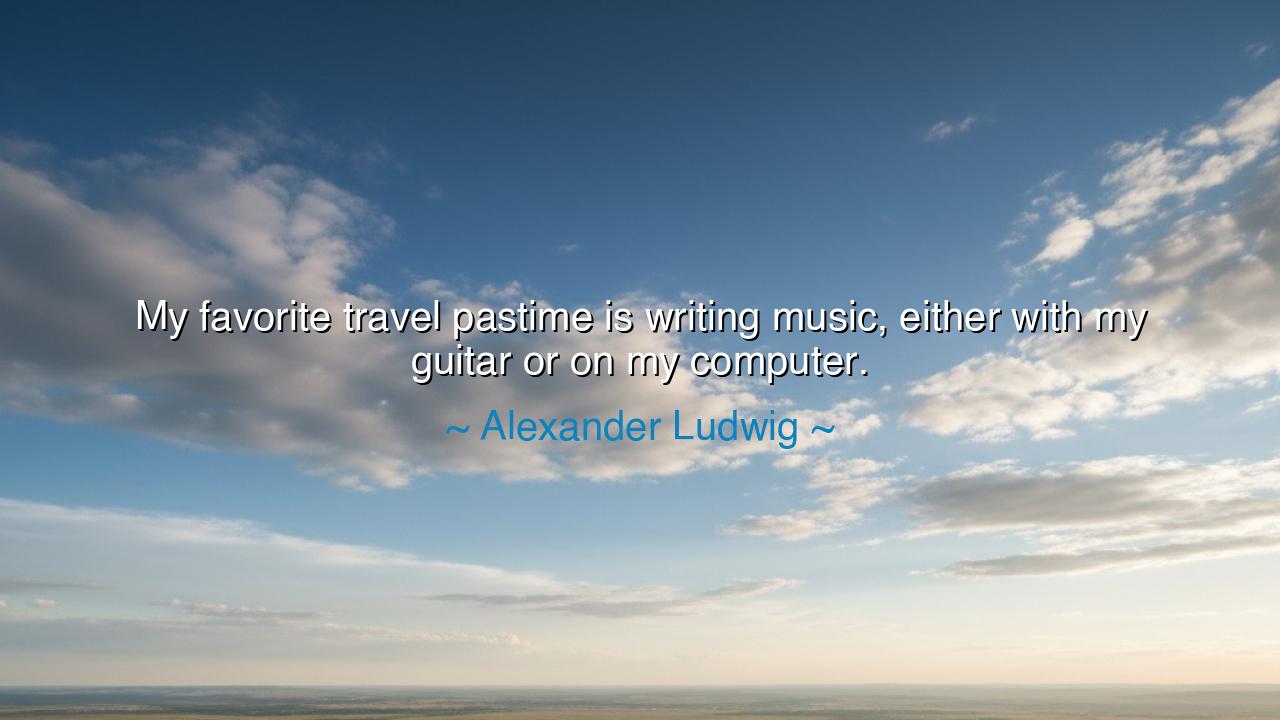
My favorite travel pastime is writing music, either with my






“My favorite travel pastime is writing music, either with my guitar or on my computer.” Thus spoke Alexander Ludwig, and though his words seem lighthearted, they reveal a profound truth about the soul’s need to create, even while journeying. For to travel is to be between worlds, to dwell in a place of transition, and in such spaces the heart often longs for anchor and expression. Ludwig shows us that music is not bound to place, but can be born wherever the traveler sets down his pack—whether in a quiet hotel room, on a train, or beneath the open sky.
When he names writing music as his favorite pastime, Ludwig affirms what the ancients always knew: that art is both companion and healer. To create while in motion is to weave beauty into the very fabric of the journey. Travel can weary the body, disorient the mind, and fill the heart with longing for home. Yet in lifting a guitar, in shaping notes upon a screen, the traveler transforms solitude into song, chaos into harmony. Music thus becomes the faithful companion that never abandons him, no matter how far from familiar ground.
The bond between travel and music has deep roots in human history. The ancient bards, carrying harps and lyres, wandered from court to court, shaping the stories of their people into song. The minstrels of the Middle Ages walked from village to village, earning bread by weaving tales and melodies that bound communities together. Even warriors and explorers carried songs with them—chanting as they marched, singing to steady themselves upon the sea. For wherever man has journeyed, music has been his solace and his voice.
A powerful example is found in the life of Woody Guthrie, the American folk singer. Traveling across the United States during the Great Depression, he carried his guitar not as ornament, but as his tool of survival and his voice of truth. In trains, fields, and crowded gatherings, he wrote songs that gave voice to the poor, the displaced, the forgotten. His music was his travel companion, and through it he transformed the hardships of the road into beauty that still echoes today. Ludwig’s pastime thus belongs to this eternal lineage: the traveler who sings his journey into being.
Yet Ludwig also reminds us that creation does not require grandeur. It can be simple—a guitar, a computer, a melody in the mind. The act itself is the gift. For the traveler who creates turns idle hours into holy moments. Instead of surrendering to boredom or weariness, he plants seeds of beauty that may one day take root in others’ hearts. This is the discipline of the artist: not to wait for perfect conditions, but to create wherever one stands, whether in comfort or in restlessness.
The lesson here is clear: in your journeys, whether far or near, carry with you not only possessions, but the means to create. For creation is what turns the road from exile into discovery. If music is your gift, carry your instrument; if words are your gift, carry a notebook; if images are your gift, carry a brush or a lens. Do not let the road silence your voice. Instead, let the road give it new form, new color, new breath.
Practical wisdom flows from this: when you find yourself in transit—waiting in airports, riding trains, or walking foreign streets—use those moments not to despair of lost time, but to shape beauty. Begin small: a sketch, a verse, a tune. Let travel, with its constant flow of new impressions, feed your creativity. In this way, you will never be empty-handed on the journey, for you will always be carrying the gift of your own expression.
Thus let Alexander Ludwig’s words endure: “My favorite travel pastime is writing music.” For in those words lies the secret of turning the transient into the timeless, of transforming solitude into song. The road may be long, but with creativity as companion, every step becomes music, and every journey becomes more than travel—it becomes art.






AAdministratorAdministrator
Welcome, honored guests. Please leave a comment, we will respond soon